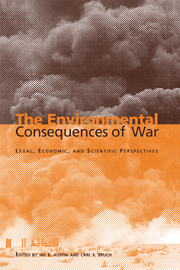Book contents
- Frontmatter
- Contents
- List of illustrations
- List of tables
- List of contributors
- Acknowledgements
- Foreword by Klaus Toepfer
- Introduction
- Part I General principles
- Part II The legal framework
- Part III Assessing the impacts – scientific methods and issues
- Part IV Valuing the impacts – economic methods and issues
- Introduction
- 19 Restoration-based approaches to compensation for natural resource damages: moving towards convergence in US and international law
- 20 Valuing public health damages arising from war
- 21 Valuing the health consequences of war
- Part V Prospects for the future
- Index
20 - Valuing public health damages arising from war
Published online by Cambridge University Press: 04 August 2010
- Frontmatter
- Contents
- List of illustrations
- List of tables
- List of contributors
- Acknowledgements
- Foreword by Klaus Toepfer
- Introduction
- Part I General principles
- Part II The legal framework
- Part III Assessing the impacts – scientific methods and issues
- Part IV Valuing the impacts – economic methods and issues
- Introduction
- 19 Restoration-based approaches to compensation for natural resource damages: moving towards convergence in US and international law
- 20 Valuing public health damages arising from war
- 21 Valuing the health consequences of war
- Part V Prospects for the future
- Index
Summary
Introduction
Environmental and public health consequences of war recently have received increased attention in light of circumstances surrounding the 1990–91 Gulf War. During the conflict, which began on August 2, 1990, Iraq demonstrated its willingness to use environmental destruction as a weapon of war by setting fire to several hundred oil wells and releasing millions of gallons of oil into the Persian Gulf. The fires burned for approximately ten months before they could be extinguished, resulting in smoke clouds that traveled as far as Pakistan and black rains that fell in several countries of the Middle East. Overall, the damage represents one of the most serious environmental catastrophes in recorded history, with adverse effects extending to human health, agricultural productivity, and to the ecosystem generally.
This chapter surveys available methods of estimating monetary damages to public health that can arise from environmental destruction occurring during wartime. These methods maybe applied to evaluating a subset of environmental claims arising from the 1990–91 Gulf War. Kuwait has submitted five claims to the United Nations Compensation Commission concerning: (1) damage to groundwater resources; (2) damage related to the formation of lakes of oil in the desert; (3) damage to terrestrial resources; (4) damage to marine and coastal resources; and (5) damage to public health. Claims for public health damages seek to recover US $1,457,761,466 in estimated present and future costs of injuries and diseases inflicted on Kuwait's citizens as a result of Iraqi aggression.
- Type
- Chapter
- Information
- The Environmental Consequences of WarLegal, Economic, and Scientific Perspectives, pp. 501 - 529Publisher: Cambridge University PressPrint publication year: 2000



